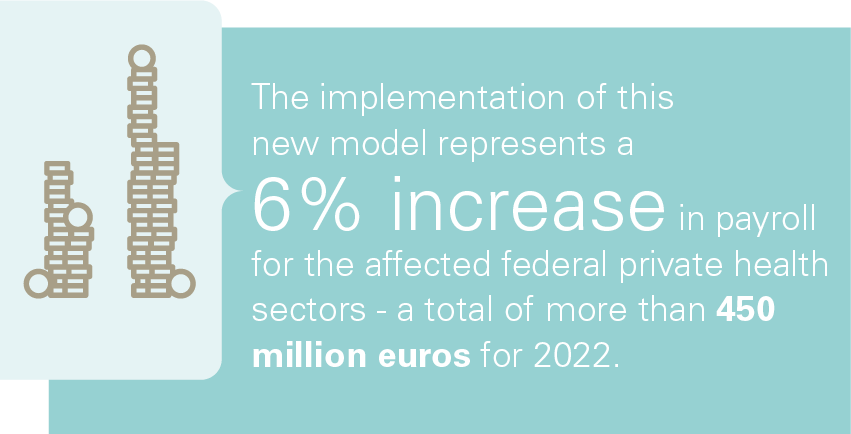The Fonds Blouses Blanches was established by the implementation of the Act of 9 December 2019. Under this Act, budgetary resources are made available to improve the employment and supervision of nursing practitioners, and the attractiveness of these professions.
The purpose of the fund is to finance a net increase in the employment of caregivers, the improvement of working conditions for caregivers, and training and support for mentoring projects.
DISTRIBUTION OF THE FONDS BLOUSES BLANCHES
(WHITE COAT FUND) RESOURCES FOR 2021 AND 2022
The expenditures that may be made from the Fund also include those for support staff who relieve the caregiver of the burden of care, and who are in direct contact with the caregiver to enable them to increase their effective time for patient care, with a priority on bedside care.
Learn more: www.becaremagazine.be
The principle of the IFIC (Institute for the Classification of Functions) is as follows: each sectoral function is described by means of identical criteria for all functions and classified in a function category on the basis of the result obtained.
To these job classifications are added salary models; the applicable scales are determined by the categories in which the jobs are classified. The new IFIC functions therefore focus on the tasks performed and the content of the function to determine the compensation to which workers are entitled.
IMPLEMENTATION IN THE FEDERAL PRIVATE HEALTHCARE SECTOR
Between September 2016 and March 2021, various collective agreements were made to implement the new classification and the new salary model.

The procedures put in place by the social partners ensure that no employee in service suffers a loss of salary as a result of the implementation.
|
The implementation took place in phases: 1. In phase 1, all workers in service on 30 April 2018 received a function award and then were given the option of opting into the new IFIC schedule or retaining their existing salary terms based on their monetary benefit over the remainder of their career, with the exception of specialist nurses who received a specific job title or specific job qualification award. An employee who opted out of the IFIC system would therefore continue to enjoy their existing salary conditions, including any future increases agreed upon. All newly hired workers since 1 May 2018 received their function award and corresponding IFIC scale directly. 2. In phase 2, starting on 1 July 2021, the implementation of IFIC was applied 100% to all employees in service, it being understood that the application of the new scales would in no way result in a reduction in salary. Nurses registered for a title or qualification who received a premium for their specialisation and were not paid according to the IFIC model retained their right to this premium as long as they continued to perform a nursing function. |
IMPLEMENTATION IN THE FEDERAL PUBLIC HEALTHCARE SECTOR
Negotiations between the social partners resulted in the conclusion, within Committee A, of four memoranda of understanding on the implementation of IFIC in the public sector.
The job classification and the associated scales are identical in the federal private and public health sectors.
The procedures put in place to supervise the implementation in the federal public sectors (assignment of duties to workers, recourse, choice of scale) were similar to the application procedures in the private sectors, but have been adapted to the specific nature of the public sectors.
Workers in service who elected the IFIC scale prior to 6 December 2020 have been paid under the new schedules since 1 July 2021.
Workers newly hired on or after 9 November 2021 are paid at the new rates if their job function was activated in the hospital. Non-activated functions are not subject to the new scales.
For more information: IFIC
